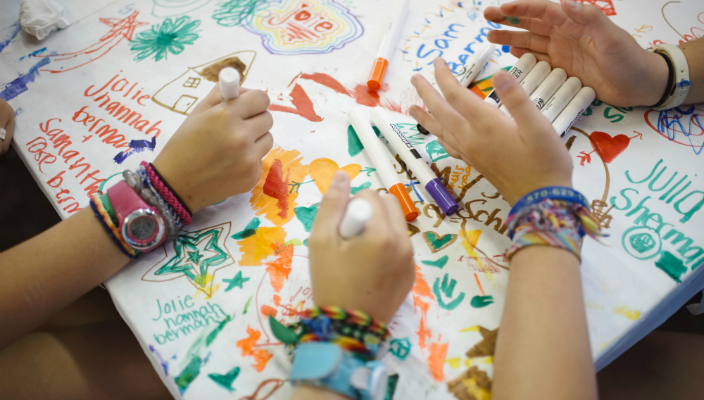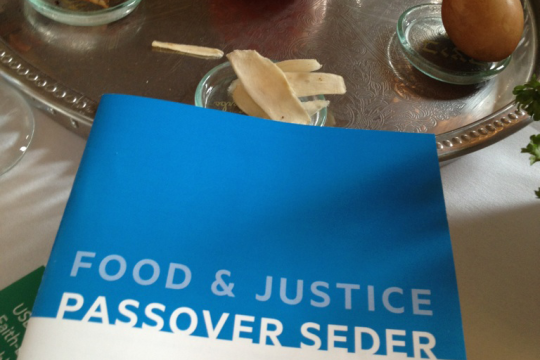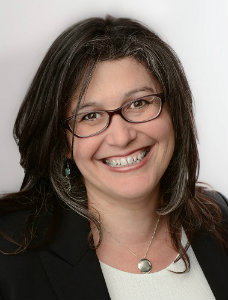
We’re happy you asked! We are excited to introduce an executive summary highlighting the innovations in our field and offering questions for a guided reflection. Here’s how to use it:
- Guide your own reading: As you read each article, these questions can help you to hone in on key concepts (all of us are busy – a little help focusing can always be helpful!)
- Explore with others: Many of us have youth committees or task forces that are exploring youth education and engagement. These articles and questions can help your committee explore guiding principles, challenge their current assumptions, or expand their thinking.
Want to get these innovations in your inbox quarterly? Subscribe to the Journal of Youth Engagement.
In this edition:
- 5 Benefits of Making Summer Camp the Focus of Our Year
- What a Jewish Student’s College Resume Can Look Like
- How I Found God at a Professional Development Retreat
"5 Benefits of Making Summer Camp the Focus of Our Year"
Beth Young, Director of Education at Temple Judea, Coral Gables, FL, shares a dynamic model that draws on the power of summer camp to create a compelling approach to Jewish education. She shares five guiding principles, with examples for each, that illustrate the power of this approach.
- Look at the guiding principles shared in the article. How does your own education program already embrace each principle? What possibilities are opened up when you think about applying them to your own program?
- If you run a post-B’nai Mitzvah program, do you feel these guiding principles still apply? What can you glean from them?
- Why do you feel so many communities are looking to camp for inspiration on how to engage their kids? Would you add any guiding principles to this list from your own camp experience or that of your families?
- In the final paragraph Beth shares that “ camp does not mean the same thing to everybody.” Look at your website and publicity materials. Are there words or concepts that may mean different things to different people? Is there a way to clarify what you mean for the reader?
"Jewish Education on a College Resume"
Julie Bressler, a fifth-year Rabbinic Education student at Hebrew Union College - Jewish Institute of Religion in Los Angeles, points out that engagement in synagogue, camp and youth group not only gives teens what they need to be happy in the moment, but also equips them with critical skills and knowledge that can help them in the “real world.”
- Reflect on your own post youth programs. How do you help prepare participants for college and beyond? When you focus on these areas, where do you see opportunities to expand?
- Educators often walk the delicate balance between Jewish life and learning being an escape from the pressures of school and being a place to learn critical skills such as those Julie writes about. How does this tension play out in your own program? When do you lean toward one direction, and when toward the other?
- Julie writes about her high school experience, “these activities and the caring adults who supervised them gave me the confidence and skills to survive high school and thrive in college.” Reflect on your own role as someone who both creates and runs programs. How do you support your teens in their own growth? How do you build the type of relationships that Julie speaks about?
"How I Found God at a Professional Development Retreat"
In this reflection on a Professional Development retreat, Rachel Opatowsky, YP101 Fellow and Temple Educator at Temple B’nai Israel, Oklahoma City, shares how she found (and created) a sacred moment for herself and the community.
- Part of the reason that Rachel shares for the connection she felt was a sense of shared purpose with the others there (in this case, “helping the Jewish people thrive”). One interesting challenge that we often have in programs is helpful by to foster this sense of shared purpose. What could a shared purpose be for your program participants? How can you help to foster it?
- In her piece, Rachel speaks to the fact that there are so many ways to connect to God outside of traditional prayer. What are some innovative ways that you have/could offer to your tweens and teens? How can we give them the chance to be creators, not just consumers, of Jewish life and celebration?
- Rachel found a spiritual experience for herself. This is often challenging for us as Jewish leaders who often are so focused on creating for others that we lose sight of our own spiritual needs. What things in this new “secular” year are you doing to connect to yourself and the Divine? How are you keeping Judaism from just “becoming your job”?
Have something to say about this post? Join the conversation in The Tent, the social network for congregational leaders of the Reform Movement. You can also tweet us or tell us how you feel on Facebook.
Related Posts

Passover 2024: The Three Central Messages of Pesach

Modern-Day Plagues of Injustice and Inequality

